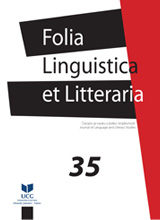Dysphemisms in Animated Films
Dysphemisms in Animated Films
Author(s): Admir Gorčević, Samina Dazdarević, Amela Lukač-ZoranićSubject(s): Media studies, Visual Arts, Lexis, Pragmatics
Published by: Filološki fakultet, Nikšić
Keywords: animated film; COCA; corpus analysis; discourse; dysphemism; English
Summary/Abstract: Current research focuses on an observational investigation of dysphemistic words and phrases in contemporary animated films. The language of animated films varies from other genres and styles, and this divergence from conventional language presents an important sociolinguistic problem. The main reason for the study is an assumption that authors and script writers of animated films use dysphemisms in this specific language style, despite the fact that they should be avoided. The study's methodological foundation is a corpus analysis which deals with three different corpora: the primary corpus – selected contemporary animated films (dating from 2017 to 2020) and the secondary – a) the native language corpus (Corpus of Contemporary American English - COCA), and b) Google search engine. The following goals were pursued in this dysphemism investigation: (1) the selection of animated films for the primary corpus, (2) identification of dysphemisms in the primary corpus, (3) sociolinguistic analysis and explanation of some of the most appealing expressions from the primary corpus, and (4) to cross-check some of the dysphemisms identified in the primary corpus against the secondary corpus. The authors believe that certain number of them are exclusive to animated films and cannot be found in the native discourse. The analysis has confirmed that the language of animated films contains dysphemisms, and that their number and nature vary from film to film. The most common dysphemisms can be found in all animated films, but those containing the most profane language are characteristic only for South Park. Further investigation revealed that certain number of dysphemistic expressions identified in the primary corpus can only be found in animated films and not in the natural discourse.
Journal: Folia Linguistica et Litteraria
- Issue Year: 2021
- Issue No: 35
- Page Range: 175-194
- Page Count: 20
- Language: English

